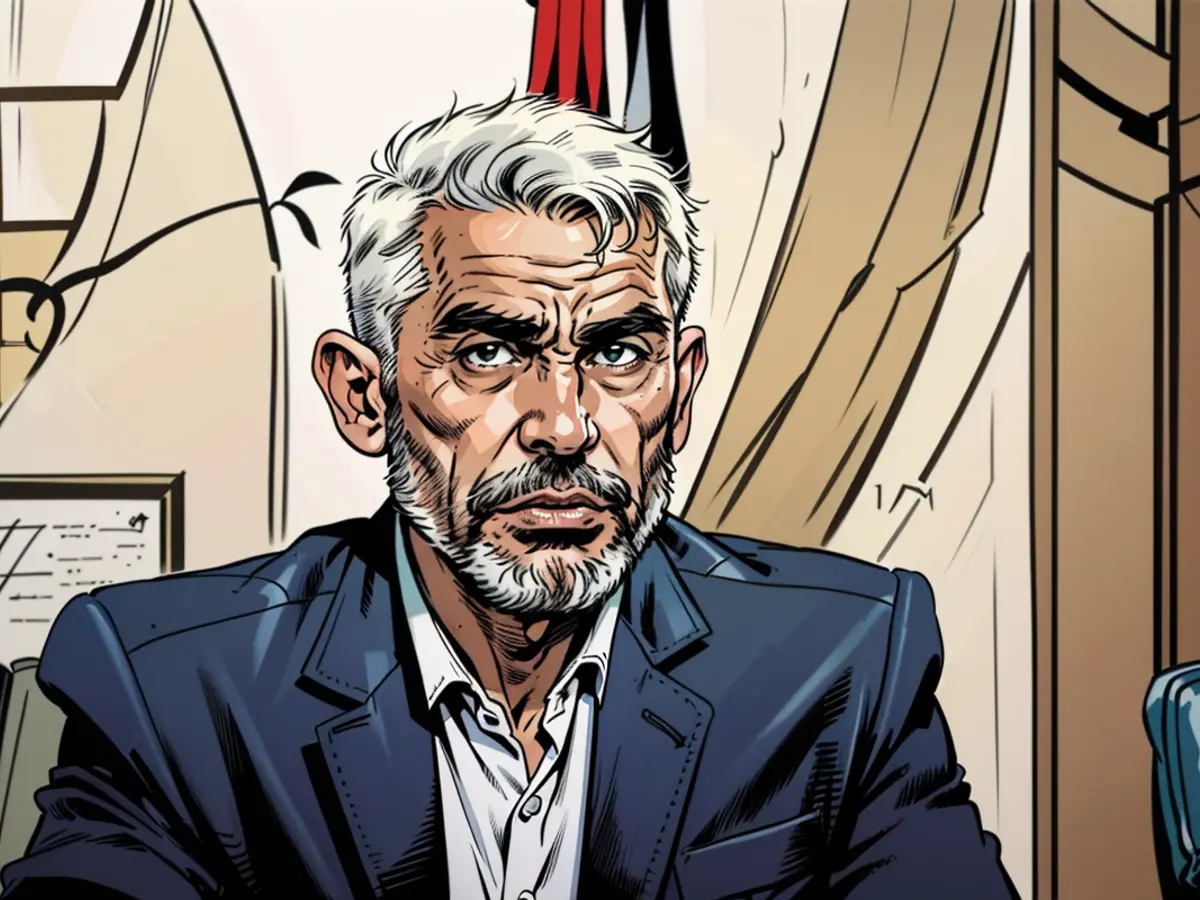Hamas representative reveals uncertainty over the number of surviving Israeli captives.
In an interview with CNN, Hamas's representative and political bureau member Osama Hamdan shared their stance on the ongoing ceasefire talks stalemate, their view on whether Hamas regrets its decision to engage in conflict leading to the increasing Palestinian death count, and their take on the recent leak of conversations of their leader in Gaza, Yahya Sinwar, allegedly the final decision-maker on any peace agreement.
The United States considers Hamas to be the crucial factor in the negotiations. Secretary of State Antony Blinken urged Sinwar to end the war, stating, "The haggling has to stop. He's relatively safe underground; the people that he purports to represent, they're suffering every day."
In Lebanon's capital Beirut, Hamdan shared with CNN that the latest Israeli-proposed plan unveiled by US President Joe Biden earlier this month did not satisfy Hamas's requirement for a ceasefire. He clarified that Hamas required "a clear commitment from Israel to accept the ceasefire, a total withdrawal from Gaza, and allowing the Palestinians to determine their own future, reconstruction, and the lifting of the siege ... and we're ready to negotiate fair deal regarding prisoners' release."
Negotiations surrounding the US-backed ceasefire plan have been more intensive in recent days but seemingly stalled after Hamas presented their response to the document 12 days after receiving it. Blinken expressed dissatisfaction with Hamas's decision to introduce several modifications, some of which exceeded positions previously held by Hamas.
"Some of the changes are workable. Some are not," Blinken said during a news conference in Qatar.
The ceasefire plan endorsed by the United Nations Security Council on Monday comprises two phases: a six-week ceasefire in which some hostages would be exchanged for Palestinian prisoners and the Israeli military would withdraw from congested areas in Gaza. The second phase - a permanent end to the war and complete Israeli withdrawal from Gaza - would only be implemented following more negotiations between the two sides.
However, Hamdan said that the duration of the ceasefire was a significant concern for Hamas, fearing Israel's lack of readiness to adhere to the second phase of the deal. "The Israelis want a ceasefire only for six weeks and then want to return to the battle, which I think the Americans, up until now, have not been able to compel the Israelis to accept a permanent ceasefire." He also emphasized that the US should compel Israel to accept a permanent ceasefire as part of the agreement.
Netanyahu has not publicly confirmed Israel's support for the ceasefire deal, despite the White House emphasizing that Israel had accepted it. The prime minister repeatedly mentioned that the war would continue until Hamas is abolished.
Blinken shared with NBC that Netanyahu "reconfirmed" his acceptance of the proposal during a recent meeting, pinpointing the blame for the standstill in the negotiations on the Hamas group. "Hamas has to give proof that it also wishes for this to end. If it wants this to end, we can bring it to a halt. If it doesn't, it means that it wants the war to persist."
Question of Accountability

Throughout the interview with CNN, Hamdan consistently evaded responsibility for the distress of Palestinians in Gaza. He regarded the October 7 assaults that triggered the current conflict in Gaza as "a response to the occupation."
The October 7 attacks claimed the lives of over 1,200 people, mostly civilians, and made off with more than 250 people. Consequently, Israel retaliated by proclaiming war on Hamas, following this with an extensive bombardment campaign and a ground assault a few weeks later.
The impact of this operation on Gaza's residents has been drastic. Approximately 37,000 people have been killed, the majority of them women and children, and an estimated 90% of the population in the territory have been displaced.
While the Gazan authorities don't differentiate between casualties among civilians and Hamas fighters, an IDF spokesperson acknowledged previously that most of the victims were civilians rather than militants.
CNN insisted on Hamdan acknowledging if Hamas regretted their decision to attack Israel. Instead, he pointed to Israel's responsibility for the suffering and asserted that resistance is the only response available against the occupation. "The one responsible for this matter is the occupation. If you resist the occupation, they will kill you. If you don't resist, they will deport you from your nation. So what are we meant to do, just wait?"
Furthermore, Hamdan contested allegations that Sinwar expressed the notion that the deaths of thousands of Palestinians were "necessary sacrifices."
Sinwar is thought to be hiding in the tunnel network beneath Gaza after the October 7 attacks. He has been labeled as a terrorist by assorted international powers including the United States, the European Union, and the United Kingdom. No public sightings of him have been reported.
The Wall Street Journal published what were purportedly leaked messages from Sinwar to other Hamas leaders recently, reportedly discussing an unflinching determination to keep fighting, regardless of the consequences for civilian casualties. Hamdan, a Hamas spokesperson, denied their veracity.
"They were fake," he told CNN. "It was fake messages created by someone who isn't Palestinian and sent to the Wall Street Journal as a part of the pressure being exerted on Hamas and to rouse public ire against a leader," Hamdan explained, without presenting any proof to back up his claims. "Nobody can abide the killing of our own people."

Obliterating Hamas?
When Israel began its war against Hamas, Netanyahu announced that the targets were to "destroy Hamas and retrieve the hostages being held in Gaza." However, over eight months later, the mission to eradicate the group completely appears to be unfeasible. Although Israeli forces have taken out some Hamas commanders, the upper echelon of leadership in Gaza, including Sinwar, remains elusive. And even with the damage sustained to its infrastructure, Hamas continues to target Israel with rocket launches, though at a reduced frequency compared to the start of the conflict.
Intelligence personnel in the United States believe that Sinwar likely sees Hamas as capable of surviving Israel's attempts to annihilate it.
Meanwhile, Netanyahu is under mounting pressure to negotiate a deal that would see the return of the remaining hostages in Gaza. Israel believes more than 70 captives, out of a total of 100 still held, are actually still alive.
Hamdan expressed ignorance on the matter when interviewed by CNN. "I have no knowledge of that," he said. "Nobody has any understanding of this."
Accusations have been levied that more hostages might be deceased than acknowledged in the public domain. In April, Hamas informed international arbitrators that it couldn't fulfill Israel's request to free 40 captives in the first phase of an agreement, including all captives deemed female, ill, or elderly, due to the lack of 40 living captives fitting these specifications for release.
Hamdan countered allegations made by a medical professional who reported the liberated hostages had been tortured and abused and suffered from both physical and mental anguish.
"I believe if they have mental issues, that's because of what Israel has done in Gaza. The daily bombing, the constant killing of civilians, women, and children...they have witnessed this first-hand," he stated, adding that the imagery of the hostages before and after their captivity shows "they were better off than before" - a claim that can easily be falsified.

Read also:
In the midst of the ceasefire negotiations, Hamas's representative in Beirut, Osama Hamdan, noted that the recent US-proposed plan for a ceasefire, presented by President Joe Biden, did not meet Hamas's requirements for a permanent end to the conflict and the lifting of the siege on Gaza. Furthermore, the international community has been closely watching the situation in the Middle East, with the United States considering Hamas as a crucial factor in the peace negotiations.







